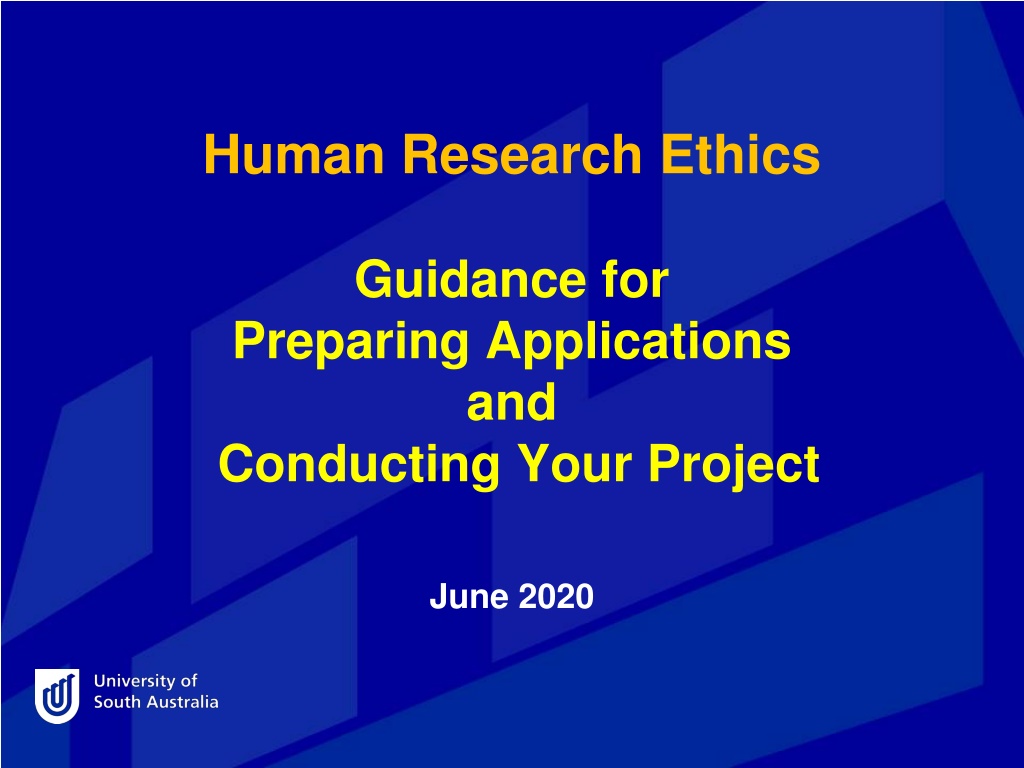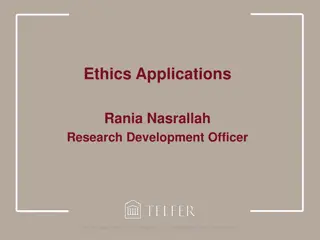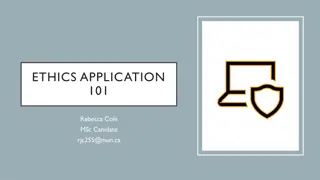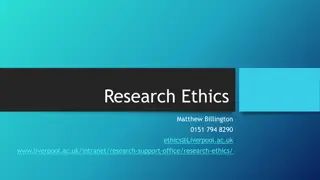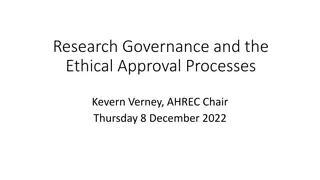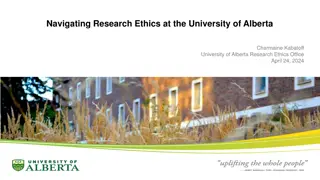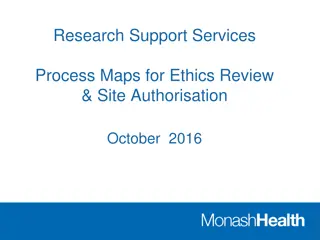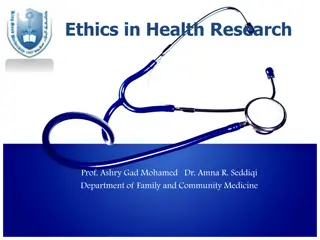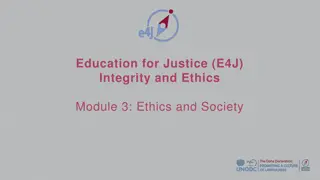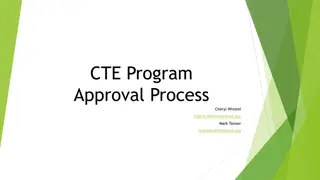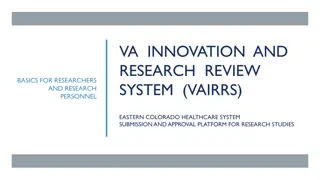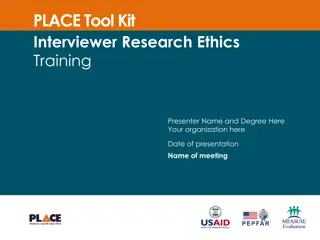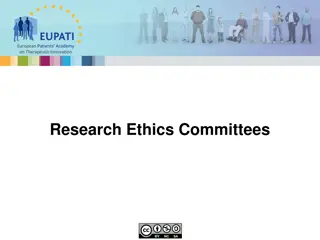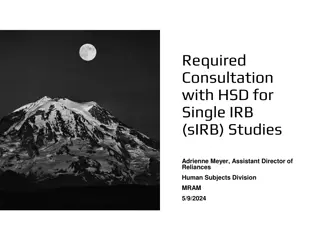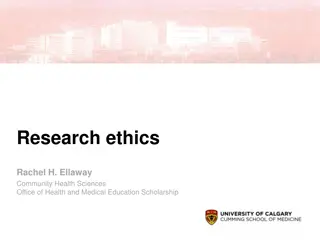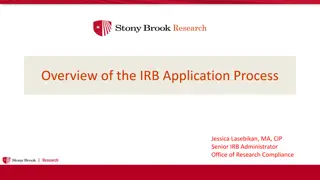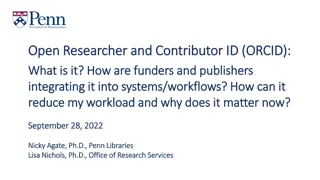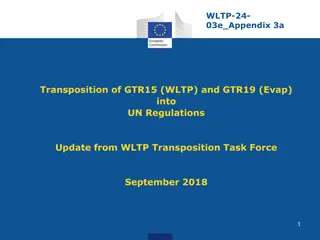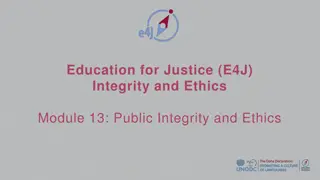Human Research Ethics Guidance for Researchers: Application and Approval Processes
This document provides comprehensive guidance for researchers on preparing applications and conducting human research ethics projects. It covers various aspects such as recruitment processes, consent processes, risk management, data collection, and reporting. The guidelines aim to ensure high-quality applications and address common issues faced during project management. Researchers can seek additional support from Research Ethics Advisors and the Human Research Ethics Team.
Download Presentation

Please find below an Image/Link to download the presentation.
The content on the website is provided AS IS for your information and personal use only. It may not be sold, licensed, or shared on other websites without obtaining consent from the author. Download presentation by click this link. If you encounter any issues during the download, it is possible that the publisher has removed the file from their server.
E N D
Presentation Transcript
Human Research Ethics Guidance for Preparing Applications and Conducting Your Project June 2020
Contents 1. 2. 3. 4. 5. 6. 7. 8. 9. 10. Recruitment Processes Part 1 11. Recruitment Processes Part 2 12. Incentives / Reimbursements Title Contents Introduction, Resources & Support UniSA HREC Approval Processes Approval from a Non-UniSA HREC Which HREC Should I Apply To First? Research Conducted Overseas Describing Project Design Participant Details 13. Consent Processes 14. Identifying & Managing Risks Part 1 15. Identifying & Managing Risks Part 2 16. Mandatory Reporting 17. Benefits 18. Data Collection & Analysis Processes 19. Using Data from the Internet / Social Media 20. Research Data Management 21. Variations to Approved Projects 22. Annual & Final Reports 23. Reporting of Results 24. If You Are Leaving UniSA
Introduction, Resources & Support This slide set is intended to help researchers create complete, high quality applications for human research ethics approval, focusing on aspects of the application form that reviewers have identified as sometimes lacking in appropriate responses or details Also addressed are some common enquiries and issues relating to the management of approved projects Guidance is also available from the Human Research Ethics webpages Further support can be obtained by contacting: Research Ethics Advisors in local areas the Human Research Ethics Team in Research and Innovation Services
UniSA HREC Approval Processes There are four possible pathways for the assessment of your human research ethics application: Exempt from requiring ethics approval Negligible Risk research reviewed as an E1 application, by the human ethics admin team and the Human Research Ethics Committee (HREC) Chair / Deputy Chair Low Risk research reviewed as an E2 application, by the human ethics admin team, the HREC Chair / Deputy Chair, and a Research Ethics Advisor All other research reviewed as an E3 application by the full HREC application must be submitted by the deadline prior to the meeting
Approval from a Non-UniSA HREC If you have ethics approval from any other NHMRC-registered HREC in Australia, you only need to have this approval ratified by UniSA You will still need to create an application in the UniSA online system, but you will be prompted to only attach a copy of the full application submitted to the other HREC and the final approval letter The UniSA HREC Chair will review these documents, and, if satisfied, will ratify the decision of the other committee The approval from the other HREC must be current (i.e., not expired), and must cover the entire period of the project if you need to amend the application, including extending the approval period, you must do that with the original approving HREC first
Which HREC Should I Apply To First? The primary HREC is guided variously by the Research Area, the Participant Category, or the Organisation of the lead researcher. For example: If you plan to conduct research with current Australian defence personnel or veterans, apply to the Departments of Defence and Veterans Affairs HREC If you plan to conduct research about the health or well-being of Aboriginal people in South Australia, apply to the Aboriginal Health Research Ethics Committee If you plan to conduct research in a hospital or Local Health Network, apply to the relevant local HREC listed via the link on the previous slide Government departments without a registered HREC usually still have departmental research approval processes. Check what is needed. For example: If you plan to conduct research in a public school, you will need to apply for approval from the SA Department for Education AFTER you receive ethics approval from UniSA
Research Conducted Overseas Research conducted in another country is when you are travelling to that country, and not when you are just collecting data from an online survey, or conducting interviews by telephone, Skype or Zoom Overseas research might have legal, social or cultural implications which would not be an issue if the research was carried out in Australia Researchers are responsible for ensuring that research conducted offshore is culturally appropriate and complies with the legal requirements of the other country, as well as complying with Australian ethical standards You may need to meet requirements relating to, e.g., visas, research permits, government permissions, or ethics approval systems of the other country it is your responsibility to meet these requirements, and written evidence of doing so must be submitted before final ethics approval will be granted by UniSA HREC However, if ethics approval is required first, in order to meet such a requirement, then the evidence described above must be submitted as soon as it is available
Describing Project Design If you are recruiting some participants or site employees to provide information about the research to others and contribute to recruitment processes (e.g., teachers assisting student recruitment; nursing staff assisting patient recruitment), ensure that these expectations are fully described in the information and consent paperwork for this group If your research design has more than one phase, and later phases rely on the outcomes of the first phase, consider applying for approval of the first phase only (whilst flagging later phases), so that the process to be approved, and the relative risks, can be clearly defined, described and assessed for each phase
Participant Details If children are participants if data collection involves direct contact with children, researchers must submit current screening clearances from the state Department of Human Services: https://screening.sa.gov.au/ (if you are in a registered occupation e.g., nurse, teacher, doctor: attach a copy of current registration) If Englishis not participants first language give details of interpreter and translation plans, and any necessary confidentiality arrangements with external providers If Aboriginal peoples are involved attach a communication and research design plan detailing involvement of the relevant community (and please consider the University s Aboriginal Research Strategy) If participants are (1) engaged in contributing data over time and (2) require a particular health status (e.g., not being diagnosed or treated for a medical condition), then specify how you will confirm that initially eligible participants have not changed status at later data collection points
Recruitment Processes Part 1 If the participants are in a dependent / vulnerable relationship detail your plan to manage recruitment to avoid coercion by researchers or those with authority over participants For all relevant projects, you will need written permission from site or organisation leaders to engage in: recruitment information dissemination (e.g., to post flyers, or allow use of membership / student / staff / patient lists); and/or recruitment and data collection processes from involved organisations (including UniSA) or social media hosts (e.g., private Facebook groups)
Recruitment Processes Part 2 You must obtain final ethics approval, and any other required approvals or permissions, before commencing recruitment for your project However, prior to applying for, or receiving, ethics approval, you can approach organisations or individuals to: develop relationships form collaborative agreements contribute to project design explore potential involvement in your project But you cannot ask people to be participants prior to receiving final approvals
Incentives / Reimbursements You may wish to provide an incentive for people to participate in your study by reimbursing participants for their time, effort or any expenses incurred (refer to the National Statement 2.2.10 and 2.2.11) This is commonly done in the form of a voucher. Preferably, vouchers will not promote a particular store or brand, but will be generic, such as EFTPOS cards. The following website allows a wide choice of retailers for participants, and carries no issuing costs for the researcher: https://www.egiftaustralia.com.au/ The amount of reimbursement must be proportional to the study burden, and must not be so high as to induce a participant to take risks that they would otherwise not take When recruiting UniSA students as participants, it is unacceptable to offer inducements related to their course, i.e., there must be no relationship between their grades and their engagement in your study
Consent Processes If consent is given by persons other than participants (e.g., parents or guardians of children; carers for dependent people), in addition to the consent form, include a verbal consent script in appropriate language to be used at the time of data collection with participants, advising them about all of the following: the research what they will be asked to do their right to refuse or withdraw the confidentiality of their data If you are asking participants for the use of images/audio/video of them for non-research purposes, e.g., promotion and marketing, you must ask them to sign a Talent Release Form, in addition to signing a consent form for participation in the research project
Identifying and Managing Risks Part 1 If you are asking people about their personal experiences and views, consider ticking personal and sensitive information If you are asking people to consider/recall topics which could conceivably relate to adverse or traumatic experiences, or arouse strong feelings, consider ticking psychological and emotional distress If you are performing any physically invasive or manipulative procedures, consider ticking risk of physical injury and/or significant pain or discomfort If you have identified risks, you need to attach a Distress Protocol detailing the strategies you will use to manage and/or minimise the risks: what will trigger action, what actions will be taken by researchers, and what resources you will provide to participants (e.g., counselling / medical services, including contact details)
Identifying and Managing Risks Part 2 In addition to the risks to participants (which may have been identified earlier in the application), the safety of the research team needs to be managed and a plan provided when researchers are: collecting data alone (e.g., in private households) in an isolated / difficult location (e.g., another country / harsh physical conditions) in a volatile situation / environment (e.g., social protest / conflict, illegal activity) any other context of risk Each context of risk requires all of the following: details of the trigger for action (e.g., researcher feels unsafe / participant faints or begins to cry); the type of action to be taken (e.g., researcher will end data collection and alert help contact or provide immediate first aid; will pause interview and ask if participant would like to stop); and the contact details and process to access suitable support services (e.g., counselling services / GP / clinic)
Mandatory Reporting Researchers must comply with mandatory reporting obligations Refer to the link below for a guide to child abuse reporting in South Australia: https://www.childprotection.sa.gov.au/reporting-child-abuse/mandated- notifiers-and-their-role If you are researching with children, or residents in aged care services, or people in circumstances where violence, abuse or illegal activities may be disclosed, you need to declare your status as a mandatory reporter in the Participant Information Sheet, and again verbally with the participant prior to data collection.
Benefits Benefits need to be considered in terms of individual participants and the community from which participants were drawn Benefits to individuals can include access to knowledge about an issue concerning them which is expected to be revealed in the research process (e.g., health information), or an opportunity to talk about something which has affected them Benefits to the community can be a product of increased knowledge about the research topic Benefits are specifically significant in relation to marginalised or vulnerable populations where there is a risk of research contributing to stigmatising deficit narratives Where a researcher stands to gain a commercial benefit, they will need to specify how this is managed in the research design to avoid bias or exploitation
Data Collection & Analysis Processes You need to attach the actual wording in the interview guides, focus group topics or survey instruments, which you plan to use to collect data Data collection procedures need to be clearly described in terms of: recruitment information and consent procedures duration, frequency, process, place requirements of participants administering personnel (and their relevant qualifications, e.g., to take blood samples) data capture process data analysis process
Using Data from the Internet / Social Media If you are collecting data online, e.g., from social media sites, you may or may not require ethics approval, depending on the specific details of your project please seek advice from a Research Ethics Advisor or the Human Research Ethics Team in RIS Your project may be exempt from requiring ethics approval if: you are accessing publicly-available data you will only publish or present these data in a non-identifiable way your research does not pose any risks to those from whom the data are sourced, including organisations You must also comply with the terms and conditions of any website or social media platform from which you are collecting data
Research Data Management You will need to identify the physical location of data storage University secure servers are preferred for digital data storage If you are using online survey platforms, the location of data storage online needs to be identified If you are collecting data in another country, the security of the data in that country needs to be managed and specified
Variations to Approved Projects Researchers must apply to vary (modify, amend) their approved ethics project, using the Project Variation Form, if any changes are required These include variations to, e.g.: members of the research team participant groups recruitment processes data collection processes data analysis processes reporting of results Associated documents (flyers, information sheets, consent forms) requiring changes must be submitted with the variation request Changes must not be implemented prior to approval
Annual & Final Reports Researchers will be prompted by an automated email to provide an annual report for an approved research project, using the report form available on the website If required, researchers may also seek an extension of ethics approval if this will expire before project completion A final report is required once the project is completed
Reporting of Results A summary of key findings to participants can be: put up on a specified website disseminated through participant networks provided as an email posted to individuals given to key community communicators
If You Are Leaving UniSA If you are leaving UniSA, you must: Inform the Human Research Ethics Team in RIS Consider if you will need to obtain ethics approval from your new institution Continue to comply with all requirements of any ongoing UniSA ethics approvals, such as variation requests and annual / final reports Ensure that all project data (both electronic and hard copy) are stored appropriately, and inform your line manager and/or the head of your local unit regarding: location of the data nature of the data requirements or restrictions relating to data access retention obligations
